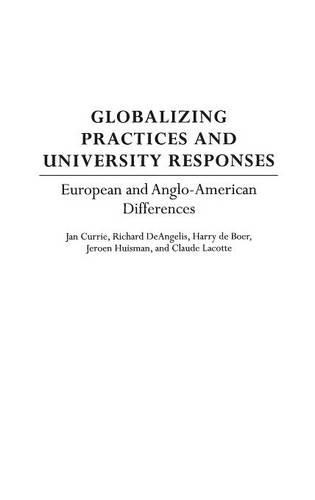
Globalizing Practices and University Responses: European and Anglo-American Differences
(Hardback)
Publishing Details
Globalizing Practices and University Responses: European and Anglo-American Differences
By (Author) Jan Currie
By (author) Richard Deangelis
By (author) Harry deBoer
By (author) Jeroen Huisman
By (author) Claude Lacotte
Bloomsbury Publishing PLC
Praeger Publishers Inc
30th January 2003
United States
Classifications
Tertiary Education
Non Fiction
Educational administration and organization
Globalization
378.101
Physical Properties
Hardback
248
Width 156mm, Height 235mm
539g
Description
Compares the impact of globalizing practices on universities in Australia, Europe, and the United States and analyzes how administrators and academics respond to crucial questions regarding the future of universities and how globalizing practices have affected lives of academics. Globalization is a contested term. It exists in the form of an integrated world economy and global communication networks. Along with this material world, politicians have created a neoliberal ideology that exhorts nation states to open up their economies to free trade, reduce their public sector, and allow market forces to reshape their public agencies. In effect, this means a reduced role for government, lower taxes, and diminishing funds for public institutions like universities. The underlying thesis of this book is that globalization is not an inexorable force. All nations need to debate its consequences. The authors analyze how globalizing practices are penetrating universities. Are they creating a certain uniformity Are academics adapting to or resisting particular globalizing practices The premise at the beginning of the study was that European universities were responding differently to globalizing practices than Anglo-American universities. This premise was confirmed as some universities saw certain globalizing practices as inevitable and other universities resisted them. The authors asked academics and key managers how their funding had changed, and which accountability mechanisms their universities adopted. They also investigated the use of the Internet in their teaching. They found differences between European and American universities in their approach to permanent employment. The French and Norwegian universities were maintaining many of their traditional values and only the Dutch university showed some movement towards the globalizing practices, which American universities were more readily adopting.
Reviews
"For those of us who have long been engaged in comparative education, this book provides both needed company and comfort to the value of our efforts. Given the events of September 11th, it is somewhat reassuring that our calls for internationalization are finally being heard. The danger of finally being "in," however, is that our entreaties for internationalization can be misinterpreted or mistaken for globalization. The authors of this text clearly identify how this mistake can be avoided. Because everyone in higher education needs to understand the effects of globalization and managerialism, there is no better place to start than with this book. This text is both for beginners and experts who wish to begin the process of becoming, what the authors rtrm, "engaged activist-scholars," who understand the challenges that lie ahead in resisting the consequences of globalization."-Ken Kempner, Dean, Southern Oregon University, Ashland, Oregon
"Globalizing Practices comes exactly at the right time. Just as those of us in higher education have begun to recognize that we have entered a brave new world, Currie and her colleagues have outlined how to make sense of that world. It's a thoughtful work that blends theoretical nuance with real-world data."-Professor William Tierney, University of Southern California
"This is a carefully conducted exploration across four universities in four very different systems of higher education, with distinctive academic and national cultures. Globalizing Practices and University Responses is an admirable example of that basic quality so necessary for good research and solid scholarship--the ability to suspend disbelief and to weigh evidence. It is welcome indeed."-Guy Neave Professor and Scientific Director, Universiteit Twente, The Netherlands
Author Bio
JAN CURRIE is Associate Professor, School of Education, Murdoch University, Australia. RICHARD DEANGELIS is Senior Lecturer in Political Science at Flinders University, Australia. HARRY DE BOER is Research Associate at the Center for Higher Education Policy Studies, University of Twente, the Netherlands. JEROEN HUISMAN is Senior Lecturer at the Center for Higher Education Policy Studies, University of Twente, the Netherlands. CLAUDE LACOTTE is Maitre de Conferences in the Faculty of Sciences and Applied Languages at the Universite d'Avignon, France.
